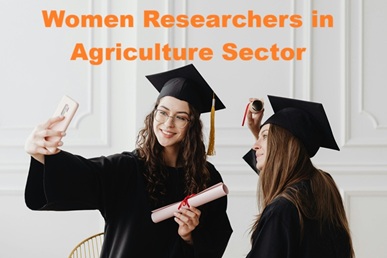Women Researchers : Rising trend in joining Agri PHD’s
The agricultural sector, once considered a male-dominated domain, is now witnessing a significant transformation with a rising number of women researchers entering the field. The increase in female participation in agricultural research is driven by various factors, including gender-inclusive policies, better educational opportunities, and the need for sustainable farming innovations.
Agriculture plays a crucial role in economic development, food security, and environmental sustainability. With the advent of modern farming techniques, biotechnology, and sustainable agricultural practices, more women are finding opportunities to contribute meaningfully to this sector. The increase in female enrolment in postgraduate (PG) and PhD programs in agriculture is a promising indicator of this trend.

The Rising Trend of Women in Agricultural Research
Increasing Female Enrolment in Higher Education in Agriculture
Recent studies and data reveal a significant rise in female participation in agricultural research programs. According to the statistics presented in recent reports:
Female participation in PG programs stands at 49.5%.
Female enrolment in PhD programs in agriculture has increased to 53.4%.
Over 48.6% of the total enrolment in agricultural UG, PG, and PhD programs is now occupied by women.
This surge in participation is not merely a statistical change but a reflection of a broader transformation in society, where women are actively choosing agriculture as a career path.
Government Policies and Initiatives Supporting Women in Agriculture
Several government and institutional policies have contributed to this rise, including:
NEP 2020 Implementation: The National Education Policy (NEP) 2020 emphasizes gender equity in education, ensuring women have access to quality agricultural education.
ICAR Initiatives: The Indian Council of Agricultural Research (ICAR) has launched several programs encouraging women to pursue research in agriculture.
State-level Policies: States like Bihar, Kerala, and Rajasthan have introduced policies promoting women’s education in agriculture, leading to a remarkable rise in female enrolment.
A Shift in Societal Attitudes
Traditionally, agriculture was perceived as a labor-intensive field with limited scope for women. However, with the emergence of agri-tech, biotechnology, and sustainable farming methods, women are increasingly finding roles that align with their skill sets, making agricultural research a lucrative career choice.
Career Growth Opportunities for Women in Agriculture
The growing demand for innovation in agriculture has opened doors for women researchers in various domains:
Sustainable Farming Research: Women are leading initiatives in organic farming, soil health improvement, and climate-resilient agriculture.
Agri-Tech and Biotechnology: The integration of technology in agriculture, such as AI-driven precision farming and genetic crop modification, has attracted women with backgrounds in science and technology.
Agricultural Policy and Development: Women researchers are actively involved in policymaking, focusing on improving rural livelihoods, promoting gender-inclusive farming practices, and ensuring food security.
Challenges Faced by Women in Agricultural Research
Despite the progress, women in agricultural research still face several hurdles:

Gender Gap and Workplace Discrimination
Although enrolment numbers are rising, gender biases persist in workplaces. Women researchers often struggle to receive equal recognition, funding, and leadership positions.
Limited Field Exposure
Many agricultural research projects require extensive fieldwork, which can be challenging for women due to safety concerns, lack of facilities, and social constraints in rural areas.
Work-Life Balance Issues
Like many other professions, women in agriculture also face challenges in balancing professional and personal life, particularly in research roles requiring long hours and travel.
Lack of Female Role Models
Although the number of women in agriculture is increasing, the presence of female mentors and leaders remains low. The absence of strong female role models makes it harder for young women to navigate and excel in the field.
How the Agricultural Sector is Evolving to Support Women
Gender-Sensitive Curricula and Inclusive Research Methods
Many agricultural institutions are introducing gender-sensitive curricula that encourage inclusive learning. More hands-on training programs, field visits, and mentorship opportunities are being designed to support women researchers.
Improved Infrastructure and Safety Measures
Institutes are focusing on providing better hostel facilities, transport services, and safety measures to ensure that women researchers can participate in field studies without fear.
Financial Support and Scholarships
Several scholarships and fellowships are now available exclusively for women pursuing agricultural research, including:
The ICAR National Talent Scholarship
The Women Scientist Scheme (WOS-A) by DST
State-sponsored agricultural fellowships
Promoting Leadership Roles for Women
Institutions and organizations are encouraging women researchers to take up leadership roles, be it in agricultural policy-making, agri-tech startups, or research institutions. Several initiatives are aimed at training women for managerial positions in agricultural research.
Success Stories of Women in Agriculture
- Dr. Vandana Shiva – A Pioneer in Sustainable Farming
Dr. Vandana Shiva is a renowned environmental activist and researcher who has contributed immensely to organic farming and biodiversity conservation in India. She has been a strong advocate for women’s rights in agriculture.
- Women-led Agri-Tech Startups
Several female entrepreneurs are making their mark in agricultural technology. Startups focusing on precision farming, AI-based soil testing, and organic food production are led by women researchers who have transitioned from academia to business.
- Female Scientists Leading Climate-Resilient Agriculture
Women researchers in various agricultural universities are working on developing climate-resilient crops, innovative irrigation techniques, and sustainable farming practices to combat climate change.
The Future of Women in Agricultural Research
The future of women in agricultural research looks promising. With continuous policy support, societal acceptance, and technological advancements, women are likely to take on even more significant roles in this sector.
Key future trends include:
Increased representation of women in agri-business leadership
More funding and scholarships for women-led research projects
Expansion of gender-inclusive agricultural policies
Rise of women-centric agricultural startups
The active participation of women in agricultural research is essential not just for gender equality but also for fostering innovation, sustainability, and food security in the coming years.
Conclusion
The rise of women in agricultural research is a testament to their resilience, dedication, and ability to innovate in a traditionally male-dominated sector. The increasing enrolment of women in PG and PhD programs in agriculture is a step towards a more inclusive and progressive research environment.
Despite existing challenges, the collaborative efforts of educational institutions, government policies, and industry support are ensuring that more women can pursue and excel in agricultural research.
As more women break barriers in this field, the agricultural sector will benefit from diverse perspectives, improved research methodologies, and innovative solutions to global farming challenges.
Disclaimer
This blog is intended for informational and educational purposes only. The statistics and insights mentioned are based on available reports and sources at the time of writing. While every effort has been made to ensure accuracy, readers are advised to verify data from official sources before making any career-related decisions.
The inclusion of names, policies, and initiatives does not imply endorsement or affiliation. The challenges and opportunities discussed may vary based on individual circumstances, geographic location, and institutional policies. The author and publisher are not responsible for any direct or indirect consequences arising from the use of this information.
For professional guidance, it is recommended to consult academic advisors, industry experts, or official government portals.


Recent Comments